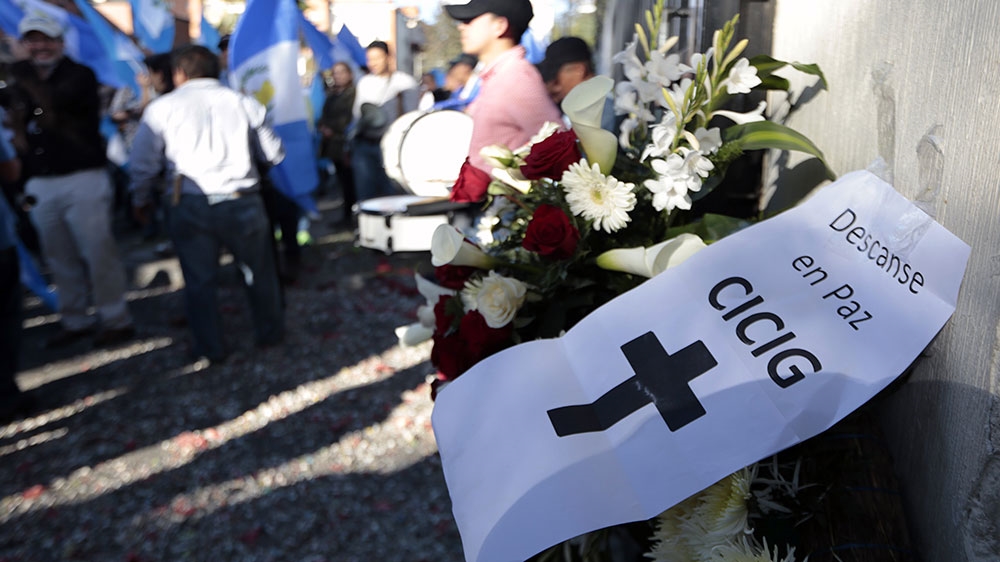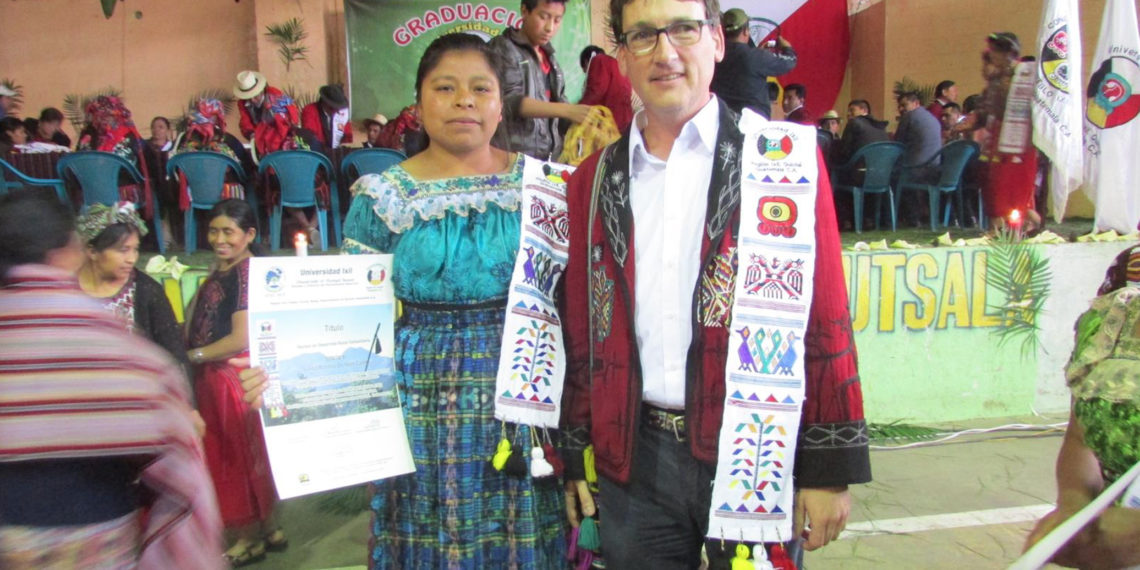On August 10, a French development worker was shot to death execution-style in rural Guatemala, one of the highest-profile murders in the Central American country in recent years.
The 60-year-old Benoit Pierre Amedee María, known as “Benito,” was an agronomist with Agronomists and Veterinarians Without Borders. He worked to alleviate poverty and support land rights in Guatemala’s Mayan highlands for more than two decades.
The murder is a warning to community activists and environmental defenders across the country. It also signals that Guatemala’s efforts to combat impunity are being unraveled by diehard forces of its bloody past.
What makes this moment so dangerous is that after years of bipartisan US support for Guatemala’s anti-impunity efforts, Trump officials and Republicans along with them have turned a blind eye as criminal networks systematically reverse human rights and rule of law gains made so laboriously after Guatemala’s 36-year civil war ended in 1996.
Guatemala’s Memories of a Violent Past
In the Ixil-Mayan region of northern Guatemala, where villagers are still uncovering mass graves from the war, Benito María helped found the Ixil University to preserve local Indigenous knowledge.
He taught organic farming to students interested in sustainable alternatives to migration. He helped set up local farmers’ markets and supported Ixil communities in their struggle to regain lands stolen by the army.
For Ixil-Mayans and many others, Benito’s murder recalls past violence.
In the 1970s in this region, Guatemalan state forces assassinated or “disappeared” scores of local leaders, including a Spanish Catholic priest.
In the early 1980s, in a brutal counterinsurgency campaign, the Guatemalan army killed thousands of Ixils and leveled rural villages, in what a UN-backed truth commission and two Guatemalan courts later called genocide.
In 1990, Guatemalan anthropologist Myrna Mack was murdered after she published a study detailing army massacres and forced displacement in the Ixil region.
After the 1996 peace accords, Guatemala made key strides to reckon with war crimes and the so-called “hidden powers” — shadowy criminal networks of active and retired military officers who used their government connections to expand illicit activities, such as moving contraband and illegal drugs and skimming hundreds of millions of dollars from public coffers.
Special high-risk courts were created in Guatemala to prosecute corruption and grave human rights cases. Ixil-Mayans brought the former military head of state, General Efraín Ríos Montt, to trial for genocide in 2013.
In 2015, Guatemala’s sitting president, former army general Otto Pérez Molina, was brought down on corruption charges by prosecutors in the country’s Public Ministry working in tandem with a UN-backed International Commission Against Impunity (CICIG).
Mayan communities across Guatemala began to press land claims, countering mining and oil interests, hydroelectric dams, and dispossession by large-scale sugar and African Palm plantations.
Just two weeks before Benito María’s murder, Ixils won a large settlement from Guatemala’s Constitutional Court mandating return of communal lands the military had expropriated in the early 1980s.
Guatemala and the US
Archconservative groups in Guatemala, including retired military officers and elites facing human rights or corruption charges, fought Guatemala’s peacetime reforms at every turn. But until recently they were held at bay, in part, by the United States.
The United States supported Guatemala’s far-right during the Cold War, yet after the peace accords US administrations — Democrat and Republican — backed Guatemala’s human rights progress, and the United States helped fund CICIG.
Shortly before Guatemalan President Pérez Molina was deposed and arrested in 2015, for example, he sought to end CICIG’s investigatory mandate. This prompted then-Vice President Joe Biden to travel to Central America to make clear that the US government supported CICIG’s work because it saw a connection between governability, crime, and migration. Republican leaders agreed.
Until Donald Trump, that is.
In 2019, when outgoing Guatemalan President Jimmy Morales — who was under investigation by CICIG for illicit campaign financing — expelled CICIG’s investigators and ended the commission’s mandate, the Trump administration said nothing.

Morales surmised correctly that what Trump wants is Guatemala’s cooperation with draconian anti-immigrant measures.
In July 2019, Morales signed a ludicrously named “safe third country” agreement with the United States, enabling the Trump administration to send Central American asylum seekers from the US southern border to Guatemala.
Trump and Morales got their quid pro quo: in exchange for Guatemala’s cooperation on the migration deal, the mafias in Guatemala got rid of CICIG.
Organized Criminal Actors in Guatemala
Organized criminal actors in Guatemala have a three-step strategy to restore their influence over the state and reverse gains made since the peace accords.
The first step was to expel CICIG.
The second step was to undermine Guatemala’s Public Ministry and Attorney General Thelma Aldana, who since 2014 had led numerous high-profile human rights and anti-corruption cases. Aldana was forced to leave Guatemala in 2019 because of physical threats and trumped-up charges, and she was granted asylum in the United States. Her successor, María Consuelo Porras, has been much more pliant.
The third step is to establish mafia control over the courts. Organized criminal networks are using their many powers to influence the selection of magistrates by the Guatemalan Congress, in direct violation of an order by the Constitutional Court, Guatemala’s highest court.
Moreover, a group of congressional deputies is trying to rescind judicial immunity for members of the Constitutional Court, bringing spurious charges to remove them — and, thus, eliminating the last obstacle to mafia rule.
Public prosecutors, human rights officials, and activists also face a torrent of malicious lawsuits that civil society groups view as retaliation for their efforts to investigate and prosecute high-level human rights and corruption cases.
High Stakes
On July 22, a group of 23 former Guatemalan public officials — including many Cabinet-level figures — and civic leaders sent an urgent appeal to US Speaker of the House Nancy Pelosi (D-CA). They asked her to intervene with the US State Department and other US agencies to rebuild a strong bipartisan policy toward Guatemala and Central America focused on supporting judicial integrity and the rule of law.
The stakes are high. Benito María’s murder is disturbing and tragic not because he was a French citizen (although that is an alarming escalation of violence), and not only for the echoes of the past, but because his life’s work was accompanying impoverished rural Guatemalans toward a sustainable future as an alternative to migration.
His death isn’t the only one; since 2018, the murder of land defenders in Guatemala has surged.
Trump believes he solved the Central American migration dilemma by ending asylum on the US southern border. But until Central Americans can organize freely around alternative visions of the future without fear of violent reprisals, the exodus will continue.
Supporting the rule of law in Guatemala and Central America deserves a strong bipartisan commitment from the United States, not the cynicism, apathy, and silence that Trump has shown.
Disclaimer: The views and opinions expressed here are those of the author and do not necessarily reflect the editorial position of The Globe Post.




















